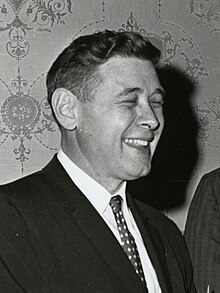Henry Walter Maier (February 7, 1918 – July 17, 1994) was an American politician and the longest-serving mayor of Milwaukee, Wisconsin, holding office from 1960 to 1988. A Democrat, Maier was a powerful and controversial figure, presiding over an era of economic and political turbulence for the city of Milwaukee.
Henry Maier | |
|---|---|
 Maier in the 1960s | |
| 42nd Mayor of Milwaukee | |
| In office April 18, 1960 – April 18, 1988 | |
| Preceded by | Frank Zeidler |
| Succeeded by | John Norquist |
| President of the United States Conference of Mayors | |
| In office 1971–1972 | |
| Preceded by | James Tate |
| Succeeded by | Louie Welch |
| Member of the Wisconsin Senate from the 9th district | |
| In office January 1, 1951 – April 18, 1960 | |
| Preceded by | Robert Emmet Tehan |
| Succeeded by | Norman Sussman |
| Personal details | |
| Born | Henry Walter David Nelke February 7, 1918 Dayton, Ohio, U.S. |
| Died | July 17, 1994 (aged 76) Delafield, Wisconsin, U.S. |
| Political party | Democratic |
| Education | University of Wisconsin, Madison (BA) University of Wisconsin, Milwaukee (MA) |
| Military service | |
| Allegiance | United States |
| Branch/service | United States Navy |
| Battles/wars | World War II |
Early life
editMaier was born Henry Walter David Nelke in Dayton, Ohio. After his father died, he moved with his mother to Springfield, Ohio to live with his grandparents. He graduated from Springfield High School in 1936. When his mother moved to Milwaukee and married contractor Charles Maier, Nelke accompanied her. He changed his name to Henry Walter Maier in 1938.
Maier served in the United States Navy during World War II. He earned a bachelor's degree from the University of Wisconsin–Madison and a master's degree from University of Wisconsin–Milwaukee. Maier was in the insurance business and taught workers' compensation and general liability insurance at the University of Wisconsin–Milwaukee.[1]
Political career
editA member of the Democratic Party, Maier was elected to the Wisconsin State Senate in 1950. In 1960 he was elected Milwaukee's mayor, succeeding Frank Zeidler, the last of Milwaukee's Socialist mayors. Maier's term included the 1967 Milwaukee riot, a response by the African-American community to a host of issues including housing discrimination and police brutality. (Maier's opposition to the Civil Rights Movement caused constant friction with his administration and Milwaukee's non-white residents). Maier remained in office for 28 years, succeeded by John Norquist in 1988. He was the longest-serving mayor in Milwaukee history.
In 1971 and 1972, he served as president of the United States Conference of Mayors.[2] A 1993 survey of historians, political scientists and urban experts conducted by Melvin G. Holli of the University of Illinois at Chicago ranked Maier as the fourteenth-best American big-city mayor to have served between the years 1820 and 1993.[3]
Later life, death, and legacy
editIn 1993, Maier wrote a political memoir: The Mayor Who Made Milwaukee Famous. He died of pneumonia at age 76 at his home in Delafield, Wisconsin. Henry Maier Festival Park, where Summerfest is held, was named in his honor.[4]
See also
editNotes
edit- ^ Wisconsin Legislative Reference Library (comp.). The Wisconsin Blue Book 1960. Madison: State of Wisconsin, 1960, p. 21.
- ^ "Leadership". The United States Conference of Mayors. November 23, 2016. Retrieved July 24, 2020.
- ^ Holli, Melvin G. (1999). The American Mayor. University Park: PSU Press. ISBN 0-271-01876-3.
- ^ "Henry W. Maier: 1918-1994-Maier Leaves Mixed Legacy". Milwaukee Sentinel, July 18, 1994, p. 11A.
External links
edit- Henry W. Maier at Find a Grave
- Henry W. Maier at University of Wisconsin-Milwaukee Libraries
- 'Urban Statesman' Steps Down in The Washington Post
- Henry Maier at Milwaukee Magazine
- Henry W. Maier (1919-2005) at CYC-Online
